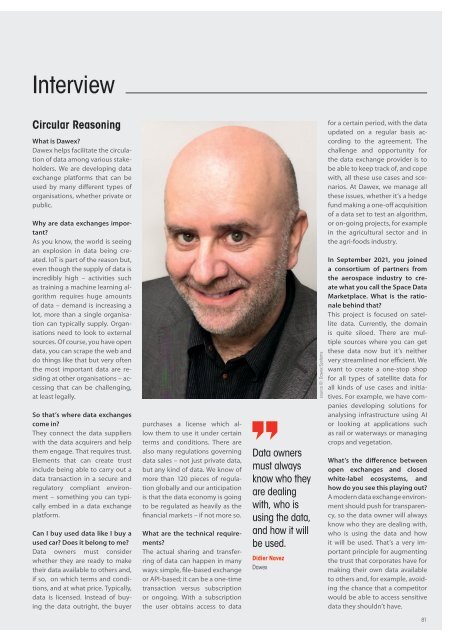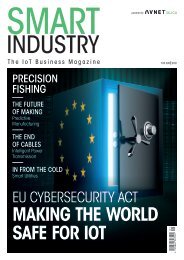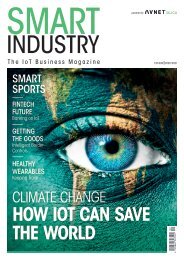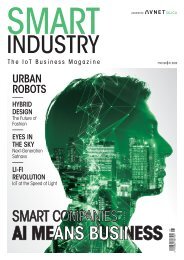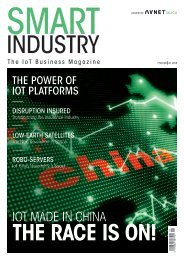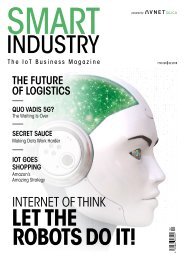Smart Industry No.1 2022
Smart Industry No.1 2022 - The IoT Business Magazine - powered by Avnet Silica
Smart Industry No.1 2022 - The IoT Business Magazine - powered by Avnet Silica
Create successful ePaper yourself
Turn your PDF publications into a flip-book with our unique Google optimized e-Paper software.
Interview<br />
Circular Reasoning<br />
What is Dawex?<br />
Dawex helps facilitate the circulation<br />
of data among various stakeholders.<br />
We are developing data<br />
exchange platforms that can be<br />
used by many different types of<br />
organisations, whether private or<br />
public.<br />
Why are data exchanges important?<br />
As you know, the world is seeing<br />
an explosion in data being created.<br />
IoT is part of the reason but,<br />
even though the supply of data is<br />
incredibly high – activities such<br />
as training a machine learning algorithm<br />
requires huge amounts<br />
of data – demand is increasing a<br />
lot, more than a single organisation<br />
can typically supply. Organisations<br />
need to look to external<br />
sources. Of course, you have open<br />
data, you can scrape the web and<br />
do things like that but very often<br />
the most important data are residing<br />
at other organisations – accessing<br />
that can be challenging,<br />
at least legally.<br />
So that’s where data exchanges<br />
come in?<br />
They connect the data suppliers<br />
with the data acquirers and help<br />
them engage. That requires trust.<br />
Elements that can create trust<br />
include being able to carry out a<br />
data transaction in a secure and<br />
regulatory compliant environment<br />
– something you can typically<br />
embed in a data exchange<br />
platform.<br />
Can I buy used data like I buy a<br />
used car? Does it belong to me?<br />
Data owners must consider<br />
whether they are ready to make<br />
their data available to others and,<br />
if so, on which terms and conditions,<br />
and at what price. Typically,<br />
data is licensed. Instead of buying<br />
the data outright, the buyer<br />
purchases a license which allow<br />
them to use it under certain<br />
terms and conditions. There are<br />
also many regulations governing<br />
data sales – not just private data,<br />
but any kind of data. We know of<br />
more than 120 pieces of regulation<br />
globally and our anticipation<br />
is that the data economy is going<br />
to be regulated as heavily as the<br />
financial markets – if not more so.<br />
What are the technical requirements?<br />
The actual sharing and transferring<br />
of data can happen in many<br />
ways: simple, file-based exchange<br />
or API-based; it can be a one-time<br />
transaction versus subscription<br />
or ongoing. With a subscription<br />
the user obtains access to data<br />
Data owners<br />
must always<br />
know who they<br />
are dealing<br />
with, who is<br />
using the data,<br />
and how it will<br />
be used.<br />
Didier Navez<br />
Dawex<br />
source ©: Dawex Systems<br />
for a certain period, with the data<br />
updated on a regular basis according<br />
to the agreement. The<br />
challenge and opportunity for<br />
the data exchange provider is to<br />
be able to keep track of, and cope<br />
with, all these use cases and scenarios.<br />
At Dawex, we manage all<br />
these issues, whether it’s a hedge<br />
fund making a one-off acquisition<br />
of a data set to test an algorithm,<br />
or on-going projects, for example<br />
in the agricultural sector and in<br />
the agri-foods industry.<br />
In September 2021, you joined<br />
a consortium of partners from<br />
the aerospace industry to create<br />
what you call the Space Data<br />
Marketplace. What is the rationale<br />
behind that?<br />
This project is focused on satellite<br />
data. Currently, the domain<br />
is quite siloed. There are multiple<br />
sources where you can get<br />
these data now but it’s neither<br />
very streamlined nor efficient. We<br />
want to create a one-stop shop<br />
for all types of satellite data for<br />
all kinds of use cases and initiatives.<br />
For example, we have companies<br />
developing solutions for<br />
analysing infrastructure using AI<br />
or looking at applications such<br />
as rail or waterways or managing<br />
crops and vegetation.<br />
What’s the difference between<br />
open exchanges and closed<br />
white-label ecosystems, and<br />
how do you see this playing out?<br />
A modern data exchange environment<br />
should push for transparency,<br />
so the data owner will always<br />
know who they are dealing with,<br />
who is using the data and how<br />
it will be used. That’s a very important<br />
principle for augmenting<br />
the trust that corporates have for<br />
making their own data available<br />
to others and, for example, avoiding<br />
the chance that a competitor<br />
would be able to access sensitive<br />
data they shouldn’t have.<br />
81


